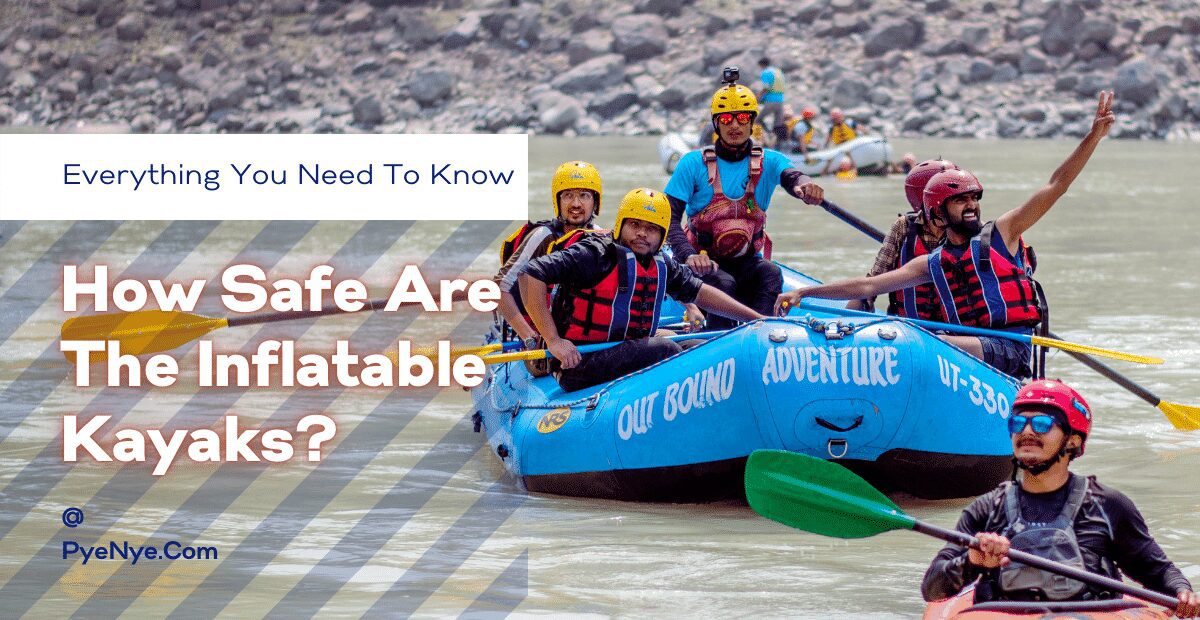An inflatable kayak is basically a boat that you can carry around, but how safe are the inflatable kayaks? In short, inflatable kayaks are good for recreational activities on the water. You can easily perform fishing, touring, and kayak camping with these kayaks. Some people may worry about how safe are the inflatable kayaks. But they’re actually really safe because they are so lightweight and usually pretty airtight.
These boats have been praised for their ease of transport and lightweight design, but they have been found to be much less stable than their rigid counterparts.
In a brief, inflatable kayaks are a great choice for people who have a limited budget or want to try out a new sport without spending a lot of money. They can also be used in smaller bodies of water such as pools and bathtubs. Inflatable kayaks are like balloons that you use around water. They’re easy to carry and store and provide hours of fun.
Jump To A Section
Are inflatable kayaks safe?
Inflatable kayaks are the same as kayaks, but they have a built-in air chamber. This means that an inflatable kayak will still float even if you puncture it with a knife. The air chamber will keep the inflatable kayak from sinking even though it has a hole in it.
However, inflatable kayaks are safe because they have a bladder inside that holds air. They will not sink even if there is a hole in the inflatable canoe.
Inflatable kayaks are a major draw for novice paddlers. Inflatable kayaks are filled with air and rely on sealing the seams to stay afloat. The advantage of this design is that they can be deflated and stored in a backpack when not in use. Deflating the kayak will greatly reduce the chance of punctures, leaks, and interior damage.
Some people like to take inflatable kayaks out into the water for safety purposes. When something happens, the person can easily swim to safety without fear of sinking down to the bottom!
How Safe Are The Inflatable Kayaks For Beginners
Inflatables are 99% safe for beginners. Because the air inside of them helps keep people afloat. They also have special “air chambers” that can be inflated if someone flips over, which will help keep the person from sinking.
The material, durability, and design of inflatable kayaks make them a safe watercraft option.
Moreover, inflatable kayaks are vulnerable to popping due to the design of the inflatable boat. The material is weaker than traditional kayaks, leading to a higher probability of popping. The material is also less durable, which means that the seams will not be as strong.
In order to successfully navigate in this type of boat, you must use your strokes with care because it is very easy to tip over due to a lack of support for standing up.
An inflatable kayak is safe to use. It’s the same as if you were on a rubber mat. A boat with air in it is safe because it can hardly sink. And you can’t get crushed by water because there’s the air that acts as a cushion.

Danger Factors Of Inflatable Kayaks
Inflatable Kayaks are a growing trend in the outdoor community. They are an ideal way to transport kayaks and gear to remote locations, reducing the need to pack-out large kayaks that can be difficult and awkward to carry overland. However, there are some dangers that can make your kayaking hard especially, when you are kayaking with the inflatable ones.
And need to consider these things before investing in this type of vessel. Let’s have a look at the common dangers of an inflatable kayak;
Knee-deep waves
Knee-deep waves are the most dangerous for kayaks. Since inflatable kayaks are lighter than hard shells, they can be easily tossed around by larger waves. There is also the risk that an inflatable kayak will pop. If this happens, you can find yourself slowly sinking into deep water and then trapped underneath it with no way of escape.
Air Leaking
Inflatable kayaks can pose a serious safety risk when the air in the kayak is compressed too much, and it can cause the user to experience what is called “the submariner’s dilemma” and drown!
If you ever find an inflatable kayak that is leaking, simply replace the air valve. The bellows at the bottom of the kayak ensure that there is always enough air in the boat to keep it afloat.
Do inflatable kayaks pop easily
An inflatable kayak is a boat that has an air chamber that you fill with air. If the boat gets punctured, sometimes it will pop. An analogy would be to think of a balloon. If you poke it with your finger, sometimes the balloon pops.
There is a wide assumption that inflatable kayaks are more prone to popping than rigid ones. This is because inflatable kayaks use air as a source of buoyancy, and over time this air can leak out, causing the boat to lose its buoyancy and eventually pop. However, most manufacturers do include a “burst valve,” which is designed to release any excess air pressure if the boat becomes too full of air and risks popping.
However, there are plenty of things that can cause the kayaks to pop, but one of the most common is if you leave them in direct sunlight. These boats use air for their structure, and when they are exposed to heat, this air expands.
Can an inflatable kayak sink
Some people might be nervous about boats that float on water, but they are safe. These kayaks don’t just sink right away. There is usually time for somebody to save you. The same is true with inflatable kayaks. They also float on water, but they don’t sink right away, so somebody can save you if something happens.
Inflatable kayaks can sink if they are not inflated enough to give them the right amount of buoyancy. They need to sit a little bit above the water in order for them to stay afloat.
While inflatables can be susceptible to sinking if punctured or overloaded, this does not happen as often as people assume, and it doesn’t happen for every product.
Are inflatable kayaks safe for fishing
Inflatable kayaks are a great way to go fishing on the water. However, they should not be used by novice fishers. In order to make your kayak fishing safe with the inflatable kayaks, you must equip with a life vest, a paddle, and a dry bag.
Should inflatable kayaks be used for fishing? This question is difficult to answer because there are many factors that need to be taken into account. One of these is the purpose in which they are using the kayak. If it is for fishing, I would say no because most people carry multiple things with them while fishing, and an inflatable kayak is not able to withstand enough weight.
Inflatable kayaks are safe because they have a self-bailing system that reduces the risk of drowning in case of sinking due to being punctured.
Inflatable kayaks can be a good choice for fishing as they are lightweight and easy to maneuver. It is important to wear a life jacket when you fish in an inflatable kayak because it can be dangerous not to!
Are inflatable kayaks safe in the ocean?
Inflatable kayaks are safe in the ocean. These kayaks are generally made of a durable material such as nylon, and they can be blown up to be thick and enjoyable. However, inflatables cannot handle waves or heavy water pressure like hard-hulled kayaks, which means that if the boat flips over, it will deflate and not provide any buoyancy. You can get ocean kayaking guidelines from here.
They are buoyant, which means that they will float even if they are punctured or partially deflated. Kayaks made of fiberglass or other heavy materials may not be as buoyant and will sink more quickly.
First, inflatable kayaks will not sink if punctured because the material is very durable and may only leak slowly.
Are inflatable kayaks worth it?
Inflatable kayaks make great alternatives to the much more expensive and much heavier hard plastic models. These inflatable kayaks can be stored and transported much easier than their pricey counterparts!
Inflatable kayaks are more lightweight and portable than traditional hard-shell kayaks. They also cost a lot less, so they can be a great option for people who want to try kayaking but don’t have a lot of money. Inflatable kayaks also need to stay inflated, so if you’ve never used one before, you have to learn how to do this.
In conclusion, inflatable kayaks are a great way to enjoy a day on the water. They’re durable, lightweight, and easy to store. The only downside is that you should be careful since they can puncture or pop if they come into close contact with an object or another person.


